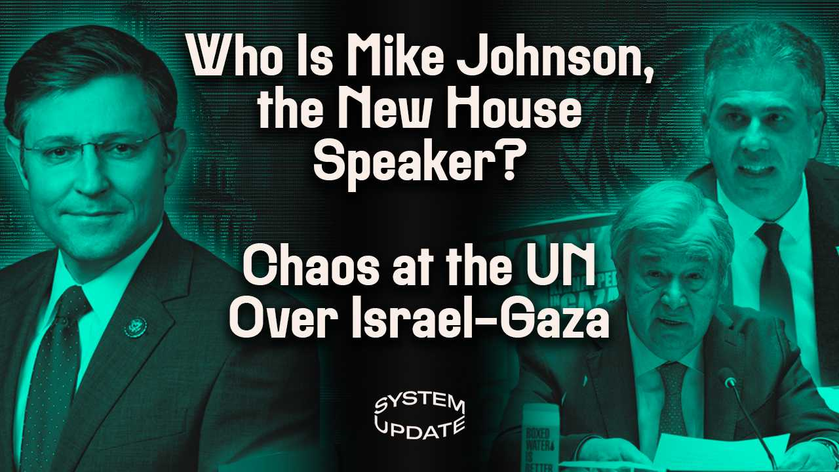Watch the full episode here:

Good evening. It's Wednesday, October 25.
Tonight: the House of Representatives today elected a new speaker of the House, the nation's 56th speaker. He is Republican Congressman Mike Johnson, of Louisiana, and he may be one of the least well-known members of Congress to be elected to the speakership in years, if not in history – which to me is already a point in his favor, given the utter failure that has come from electing those the next in line or those who have squirmed their way up the establishment ladder, all of whom, by definition, are craven partisan hacks who have mastered the art of backroom deals and horse trading so thoroughly and there’s rarely anything left besides that.
Back in July, we interviewed Congressman now House Speaker Johnson after he had spent the day grilling FBI Director Christopher Wray about the FBI's role in pressuring Big Tech to censor the Internet, the political speech of American citizens. Both from that hearing and then the interview we conducted with him, I walked away, as I said at the time, quite impressed. A constitutional lawyer by training, Johnson's harsh critiques and relentless questioning of the FBI director were very well-informed, very clever and clearly based on genuinely held convictions, something rare in Washington – genuinely held convictions about the massive abuses of power perpetrated by the U.S. security state, especially when it came to interference in our domestic politics.
However, it goes without saying, that there's a lot more to being a speaker than just being able to flourish on a handful of issues. Mike Johnson has just become the most powerful person in Congress and third in line to the presidency. What Mike Johnson thinks about matters of war and peace, especially now, is of the utmost importance, as are his views on the role of government and the U.S. security state generally. We'll tell you what we know and what can be gleaned from his history of voting, advocacy and activism and his role in Congress.
Then: the war between Israel and Gaza – waged almost entirely in Gaza – continues to escalate, and this week it seems to be unleashing and spreading intense hatred and tribal vitriol of the kind we have not really seen for quite some time. Far away from Israel, in virtually every country in the West – but most definitely the United States – intense passions, anger and rage are driving not only the debate over Israel and Gaza but are also provoking all new debates about what the limits of free speech should be here in the United States. Even though the United States wasn't attacked, this vitriol spilled over today in a very unusual way at the United Nations, where Israel announced that it will henceforth refuse to grant visas to UN officials, after Israel reacted with rage over a speech by the UN Secretary-General Antonio Guterres, which included some extremely mild and barely noticeable, very indirect criticisms of Israel. We report on this conflict and the consequences of what happened at the UN.
And then finally, even though once again the United States was not attacked by Hamas, calls for the federal government, including the FBI and Justice Department, to wield more power to fight Hamas and fight terrorism and the sentiments driving it continued to grow. Yesterday, Florida Governor Ron DeSantis ordered the University of South Florida to immediately abandon the campus group called Students for Justice in Palestine, with the governor alleging that it is providing material support for Hamas for terrorism. All of that is very redolent of what happened after 9/11, with the very obvious and vital difference being that our own country, the United States, was actually attacked 22 years ago, but this time it was not. Back then, as now, barely a day went by when prominent political and media figures argued for new powers to be vested in the U.S. security state in the name of stopping domestic terrorism and domestic extremism. As we demonstrated on our Friday night special episode about the post-9/11 abuses, those new powers rarely did anything to stop terrorism, but they were invariably abused in all sorts of ways, including for domestic political advantage, especially after we just went through 20 years of vesting the U.S. security state with more and more power in the name of stopping terrorism. We should be very wary, very suspicious of those who are exploiting this new war that isn't even ours to argue for still greater expansions of state power.
For now, welcome to a new episode of System Update, starting right now.






















